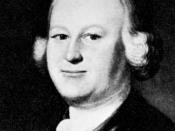Ferguson v. City of Charleston
Affirming the right to confidential medical care for all Americans, the United States Supreme Court struck down a drug testing scheme targeting pregnant women developed by local police and prosecutors in collaboration with doctors in a South Carolina hospital.
In its 6-3 decision in Ferguson v. City of Charleston, the Court found that the Medical University of South Carolina drug testing scheme was in direct violation of the Fourth Amendment, which provides all Americans with protection from unreasonable searches.
1. United States v. Arvizu, 534 U.S. 266 (Jan. 16, 2002) (9-0) (Border Patrol stop was based on reasonable suspicion); United States v. Knights, 534 U.S. 112 (Dec. 10, 2001) (9-0) (warrantless search of probationer's home was permissible on reasonable suspicion); United States v. Drayton, 536 U.S. 194 (June 17, 2002) (6-3) (passenger questioned on bus was not "seized"); and Board of Education of Indep. School Dist.
No. 92 of Pottawatomie County, Okla. v. Earls, 536 U.S. 822 (June 27, 2002) (5-4) (drug testing of students participating in extra-curricular activities was permissible).
2. Three cases found Fourth Amendment violations, see Kyllo v. United States, 533 U.S. 27 (2001) (thermal imaging is a "search"); City of Indianapolis v. Edmond, 531 U.S. 32 (2000) (drug interdiction checkpoint was impermissible); Ferguson v. City of Charleston, 532 U.S. 67 (2001) (hospital's warrantless drug tests of pregnant women were impermissible), while two others did not, see Atwater v. City of Lago Vista, 532 U.S. 318 (2001) (arrest for fine-only traffic offense is permissible); Illinois v. McArthur, 531 U.S. 326 (2001) (preventing occupant from entering home during execution of a search warrant is permissible).
The most portentous case is Maryland v. Pringle (02-809), which poses an important question about the meaning of the Fourth Amendment's probable cause requirement. A Baltimore...


